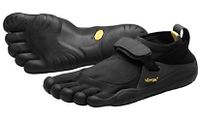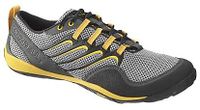Best Running Shoes
These reviews cover what I consider to be the best running shoes. I believe that a running shoe should not interfere with the way you run, and therefore I favor the minimalist style of shoe. Minimalist running shoes tend to have less cushioning, more flexible soles, and less of a high reduction (drop) between the heel and forefoot. The shoes below vary in their characteristics, with some providing just a thin barrier between your feet and the ground, while others are an evolution of the traditional running shoe. In the middle is the "Minimum Drop, Maximum Cushioning" (MiniMax) category of shoes that provides the plenty of cushioning without the raised heal.
Contents
1 Where to Buy
I generally recommend buying shoes from RoadRunnerSports.com as they allow you to run in the shoes and still return them for an exchange. It's hard to know how a shoe works for you until you've run in it for some distance. Another good option is Zappos.com which provides free shipping both ways, which allows you to spend time wearing the shoes around the house to see how they fit, though you can't run in them and return them.
2 Shoe Modifications
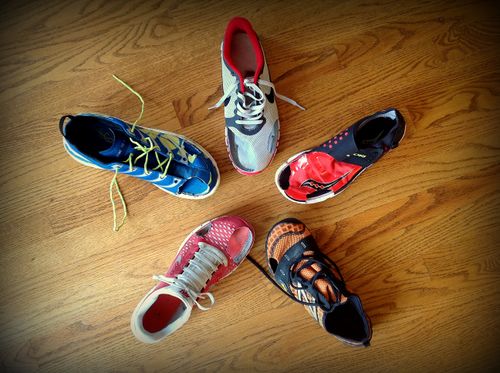
With the exception of the FiveFingers, the Mizuno Curoris and to a lesser extent the Altra Torin, I find that all shoes benefit from cutting open the toe box. This allows the toes to spread out as you toe off, creating more natural biomechanics and preventing toe blisters.
3 Summary Table
I've categorized my shoe recommendations into several categories.
- Virtually Barefoot. These shoes are close to barefoot, but have some protection.
- Minimalist. If you want a little more protection and cushioning than the virtually barefoot options, but want to stay as close as you can, this is the next step up.
- Minimum Drop, Maximum Cushioning. The minimal drop has the hallmark of a minimalist shoe, but these shoes also include lots of cushioning. At their best, these shoes can be like running barefoot on a cushioned track.
- Transitional. These shoes are close to a traditional running shoe, but have reduced heel height.
- Traditional. The classic running shoe has a high heel, normally about 10mm. I'm not a fan of running in high heels, so I have no recommendations in this category.
| Category | Shoe | Weight | Drop | Sole thickness | Use | Notes |
|---|---|---|---|---|---|---|
|
Virtually Barefoot |
FiveFingers KSO | 5.7oz | Zero | Road/Trail | No laces | |
| FiveFingers KSO Treks | 6.7oz | Zero | Road/Trail | No laces | ||
| FiveFingers Bilika LS | 6.5oz | Zero | Road/Trail | |||
| Vivo Barefoot Evo II | 9.7oz | Zero | Road | |||
|
Minimaist |
Modified Nike Free | Varies – 5 to 6oz | Zero | Road | ||
| Saucony Hattori | 4.4oz | Zero | 15mm | Road | No laces | |
| NB Road Minimus | 6.4oz | Zero | Road | |||
| Merrell Trail Glove | 6.2oz | Zero | 10mm | Road/Trail | ||
| Merrell Road Glove | 6.5oz | Zero | 11mm | Road | ||
|
Minimum Drop, Maximum Cushioning |
Saucony Virrata | 6.7oz | Zero | 17mm | Road | |
| Mizuno Cursoris | 6.8oz | Zero | 18mm | Road | ||
| Altra Torin | 9.0oz | Zero | 20mm | Road | ||
| Hoka Bondi 2 | 11.7oz | 4mm | 29/35mm | Road/Trail | Extreme cushioning | |
| Hoka Mafate 2 | 13.6oz | 4mm | 29/35mm | Muddy Trail | Extreme cushioning | |
|
Transitional |
Nike Free 3.0 | 6.9oz | 4mm | Road | Highly flexible | |
| Mizuno Wave Universe | 3.8oz | 4mm | Road | Lightweight | ||
| Inov-8 F-Lite 195 | 6.8oz | 3mm | Road/Trail | |||
| Inov-8 X-Talon 190 | 6.7oz | 3mm | Muddy Trail | Aggressive tread | ||
| NB Trail Minimus | 7.7oz | 4mm | Road/Trail | |||
| Saucony Kinvara | 7.7oz | 4mm | Road |
4 Virtually Barefoot
If you want to get as close to barefoot as you can, the best option by far is the FiveFingers. However it can be tricky to get them to fit right if you have an unusual shaped foot, in which case consider the Vivo Barefoot.
4.1 Vibram FiveFingers
FiveFingers are popular Minimalist Running shoes. They are a thin sole combined with just enough material to hold them to your foot and a separate pocket for each toe, hence the name FiveFingers. They were originally created for boating, not running, but they have become hugely popular. I would recommend either the KSO (Keep Stuff Out) or the KSO Treks. The Trek version has a leather upper and a thicker sole. The FiveFinger soles generally last a long time, but the uppers can be prone to tearing. Getting FiveFingers that fit can be tricky depending on the shape of your foot, so they don't work for everyone. The Bilika LS are slightly wider and have laces, which improves the fit for some.
4.2 Vivo Barefoot
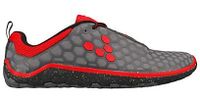
Terra Plana make a range of thin soled shoes under the 'Vivo Barefoot' name. Their Vivo Barefoot Evo II has a good reputation for minimalist running, with a flexible but tough sole.
5 Minimalist Shoes
These are zero drop shoes with minimal cushioning, but they are not virtually barefoot.
5.1 Modified Nike Free
With modification, the Nike Free 3.0 can provide a minimalist shoe with just enough cushioning to provide good protection. I prefer the Modified Nike Free to Vibram FiveFingers, as the small amount of extra padding protects my feet much better, while the flexibility gives a surprisingly similar experience. The longevity of the Modified Nike Free is good, lasting for 2,000+ miles.
5.2 Saucony Hattori

The Hattori is a lightweight (4.4oz), zero drop shoe, but the sole is less flexible than the Nike Free and the sock style upper limits the fit. Zappos has the Hattori LC which has laces instead of a sock upper.
5.3 New Balance Minimus
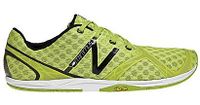
The Minimus is a range of minimal shoes from New Balance that has created a lot of interest in the minimalist running community as the trail shoe was designed with the help of ultrarunner Anton Krupicka. There is a Trail Minimus and a Road Minimus which share similar names, but are rather different shoes. The Trail Minimus worked well for me on mild trails, but I prefer the Modified Nike Free to the road version.
5.4 Merrell Gloves
Merrell sells a trail glove and a road glove. The trail glove has a thin forefoot plate and both are zero drop.
6 Minimum Drop, Maximum Cushioning
This is an emerging category of shoes, started by Hoka and followed by several others. None of the competition can match the Hokas for their huge, oversized soles made of extra soft foam, but they tend to be lighter and better designed. Comparing the shoes at a high level:
- The best all round shoe in this category is the Torin.
- The Hoka has greater cushioning and protection, but is heaver and pricy.
- The Cursoris is soft, light and seems faster, but has less protection and longevity.
- The Virrata is nearly as good as the Torin, but cheaper.
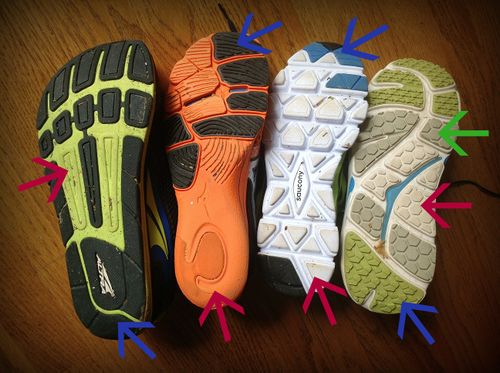
6.1 Hokas
Main article: Hoka Shoe Review
The Hoka shoes started the 'Minimum Drop, Maximum Cushioning' style of shoe and are still unique in their level of cushioning. The Hokas use extremely soft foam, with a wide base to improve stability. Their soles are at least 50% thicker than the other shoes in this category, so they are quite heavy, though not as heavy as they look. Most of the Hokas do well on both asphalt and rocky trails, though the Mafate is designed for softer trails and does not like asphalt. The Hokas provide remarkable protection from rough trail surfaces, and the thick, soft soles mold themselves around stones to provide more grip on rocky trails than you'd expect. Other than the sole, the Hoka is a poor design, with a remarkably tight toe box.
6.2 Mizuno Cursoris
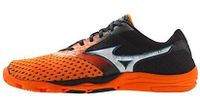
The Cursoris is a light shoe with a soft sole, almost as soft as the Hokas, but only half the thickness so overall the cushioning is less. The Cursoris is clearly a road shoe, with little protection from stones, and no outsole grip. The toe box is the biggest and best designed of any shoe I've tried, even better than the Altra's. The upper is soft, which some people find strange and can result in them being over tightened. Once you get used to the feeling that they're barely there, they stay in place well.
6.3 Altra Torin
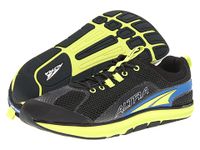
The Torin is superficially similar to the Cursoris, with a similar shape and sole. However the Torin uses a much firmer foam, so it feels quite different. Like the Cursoris, the Torin is a road shoe, with no outsole grip. While the Torin has a better toe box than nearly every other shoe, it's not as good as the Cursoris. The Torin has lots of space beside the big toe, but the smallest toe is more cramped and the roof of the toe box is low. There are a lot of complaints about the lacing on the Torin not coming up the foot high enough so it feels like there is too much movement around the ankle. While this feels a little odd, I did not notice any actual problems from this unless the laces are loose.
6.4 Saucony Virrata
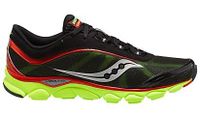
The Virrata feels almost identical to the Torin, and when I wore one on either foot I found I could feel only minor differences in the sole. The toe box however is like most other shoes and is way too small, but cutting the toe box open mostly solves the problem. The Virrata is a nice shoe, and while not as good as the other shoes in this category, it's quite a bit cheaper than all the others.
7 Transitional
These are not zero drop, but they have less drop than a traditional shoe, are lightweight and flexible.
7.1 Nike Free
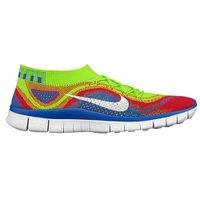
Nike Free are running shoes that are light weight, with very flexible soles. Even without modification, the Nike Free 3.0 is a good minimalist running shoe and a half way house to a zero drop shoe. There is no outer sole (the hard rubber that meets the road), just a robust midsole (the cushioning part). The midsole has deep groves cut into it to allow the shoe to flex more than is possible with a traditional shoe. There are lots of different models of Nike Free, but I would recommend using the Free 3.0. (Most Frees have a number that indicates how flexible they are. The idea is that 10.0 would be a traditional shoe and 1.0 would be barefoot.)
7.2 Mizuno Wave Universe

The Mizuno Wave Universe is a racing flat that is surprisingly comfortable and remarkably light weight. I ran in these before I discovered the Nike Free and got on well with them.
7.3 Inov-8 Trail Shoes
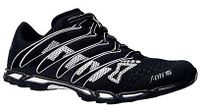
Inov-8 produces a wide range of minimalist trail shoes. Of particular note are their X-Talon 190 for muddy conditions and their F-Lite 195 for rocky conditions. I've used a number of Inov-8 shoes and I highly recommend them, especially for the more gnarly and technical trails.
7.4 Saucony Kinvara
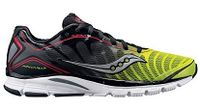
The Saucony Kinvara is an evolution of the traditional running shoe towards a minimalist design. It looks like a traditional running shoe, but lowers the heel and reduces the weight. To me, this shoe is on the boundary between minimalist and traditional, though others might include some of the Brooks Pure range as minimalist.
8 The Newton
Newton shoes focus on forefoot running by adding extra height to the forefoot of the shoe. I purchased a pair thinking they would move me closer to barefoot running. The result of the high forefoot is an unstable shoe. I believe the Newton takes a bad idea (the traditional running shoe) and makes it worse. You can get a better alternative to the Newton just by hacking the sole heel off an old pair of running shoes. (The Newton is mentioned in The 4 Hour Body as a shoe that is correlated with injuries.)
